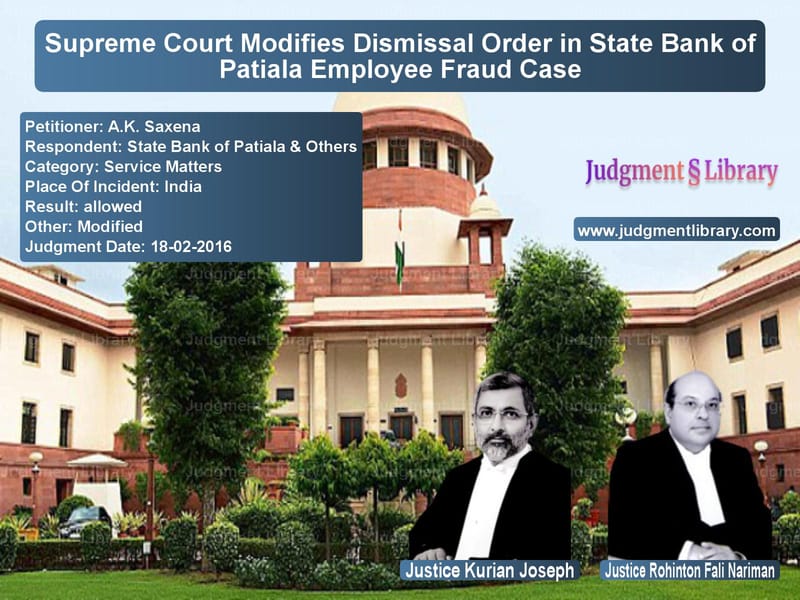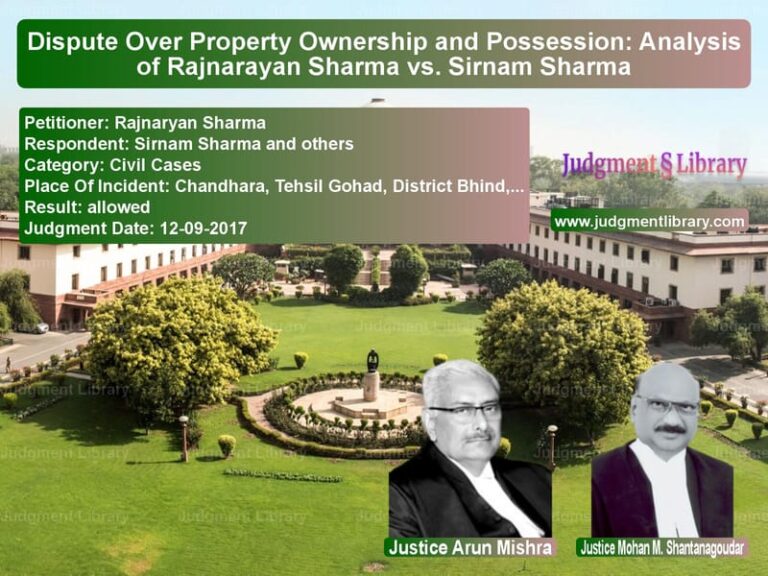Supreme Court Modifies Dismissal Order in State Bank of Patiala Employee Fraud Case
The Supreme Court of India, in the case of A.K. Saxena vs. State Bank of Patiala & Others, addressed the wrongful termination of a bank employee accused of fraud. The Court modified the dismissal order and instead treated the petitioner as retired from service after completing 15 years, allowing him to receive pension benefits.
The ruling emphasizes that employers must maintain fairness in disciplinary actions, particularly when multiple employees are involved in the same alleged offense.
Background of the Case
The case revolves around the alleged fraudulent withdrawal of Rs. 80,000 from a customer’s account at the State Bank of Patiala. The petitioner, A.K. Saxena, was employed as a Cashier-cum-Clerk since October 21, 1978. After a preliminary inquiry into the fraud complaint filed by Hari Shankar Yadav, a departmental inquiry was conducted, leading to Saxena’s dismissal from service on July 2, 1993.
The petitioner challenged his termination before the Labour Court, which found the dismissal illegal and ordered reinstatement with back wages. However, the bank appealed to the High Court, which overturned the Labour Court’s decision, prompting the petitioner to approach the Supreme Court.
Petitioner’s (A.K. Saxena) Arguments
- The fraud involved four employees, but the bank selectively punished him while sparing others.
- The complainant, Hari Shankar Yadav, did not file any criminal case against him.
- The Labour Court had taken a plausible view based on the evidence, and the High Court should not have interfered with it.
- While the High Court ordered denial of future promotions and increments for the other three employees, Saxena alone was dismissed, constituting discrimination.
Respondent’s (State Bank of Patiala) Arguments
- Saxena was the Head Cashier and the mastermind behind the fraud.
- The other three employees only acted on his instructions without knowing the fraudulent nature of the transaction.
- The bank had also initiated disciplinary proceedings against the three other employees, though they were allowed to continue working.
- The High Court correctly overturned the Labour Court’s decision because Saxena’s involvement in the fraud was proven.
Supreme Court’s Ruling
The Supreme Court, in a judgment delivered by Justices Kurian Joseph and Rohinton Fali Nariman, modified the dismissal order and allowed the petitioner to be treated as retired, making him eligible for pension benefits.
1. Disproportionate Punishment Not Justified
The Court found it unfair that only Saxena was dismissed while the other three employees were merely denied promotions.
“We put a query to the learned counsel for the Bank as to how the appellant alone is discriminated and dismissed from service.”
2. No Clear Proof of Mastermind Role
The Court rejected the argument that Saxena was the sole mastermind, stating that evidence against him was similar to that against the other employees.
“We find it difficult to appreciate the submission in view of the factual position as noted above.”
3. Modification of Dismissal to Retirement
The Court ruled that Saxena should be deemed to have retired after completing 15 years of service, making him eligible for pension benefits.
“The appellant shall be treated to have been retired from service on completion of 15 years of service and accordingly, his retiral benefits shall be settled for the purpose of future pension from the month of February, 2016.”
Final Verdict
The Supreme Court issued the following directives:
- The appeal was allowed, and the dismissal order was modified.
- Saxena shall be considered retired from service after completing 15 years.
- His pension benefits shall be restored, effective from February 2016.
- No arrears of pension would be paid since he had already received Rs. 14,05,417 as back wages and Rs. 9,34,573 under Section 17B of the Industrial Disputes Act.
- The bank was directed to settle his retirement benefits promptly.
Conclusion
This judgment highlights the importance of fairness in employer disciplinary actions and ensures that punishment is not disproportionate compared to similarly situated employees.
Key Takeaways:
- Disciplinary actions must be applied consistently among all involved employees.
- Labour Courts’ plausible findings should not be overturned without strong reasons.
- Retirement benefits should not be denied if dismissal is found to be excessive.
- Employers must ensure fair treatment in fraud-related investigations.
This ruling serves as an important precedent for employment law, protecting employees from excessive punishment while maintaining accountability in workplace fraud cases.
Don’t miss out on the full details! Download the complete judgment in PDF format below and gain valuable insights instantly!
Download Judgment: A.K. Saxena vs State Bank of Patial Supreme Court of India Judgment Dated 18-02-2016-1741852855770.pdf
Direct Downlaod Judgment: Direct downlaod this Judgment
See all petitions in Employment Disputes
See all petitions in Termination Cases
See all petitions in Pension and Gratuity
See all petitions in Judgment by Kurian Joseph
See all petitions in Judgment by Rohinton Fali Nariman
See all petitions in allowed
See all petitions in Modified
See all petitions in supreme court of India judgments February 2016
See all petitions in 2016 judgments
See all posts in Service Matters Category
See all allowed petitions in Service Matters Category
See all Dismissed petitions in Service Matters Category
See all partially allowed petitions in Service Matters Category







